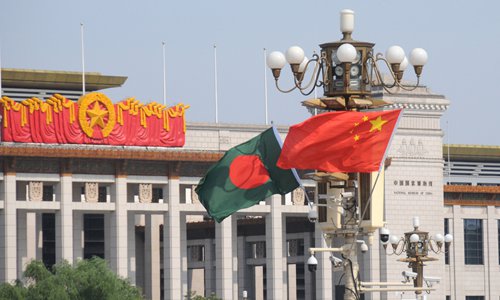HOME >> OPINION
Hasina in balancing act between China, India
By Zhang Xiaoyu Source:Global Times Published: 2019/7/7 19:33:39

Photo: VCG
Prime Minister of Bangladesh Sheikh Hasina wrapped up her three-day official visit to China on Saturday. The Bangladeshi leader's first visit to China since she got re-elected in January has been largely successful.
Hasina met President Xi Jinping and Premier Li Keqiang, and signed nine agreements with China. Hasina has deepened cooperation with China in power, technology, investment and culture. She has ensured Bangladesh's stepped-up role in the promotion of the China-proposed Belt and Road Initiative and the Bangladesh-China-India-Myanmar (BCIM) Economic Corridor.
Closer economic ties between China and Bangladesh do not come as a surprise, as the main goal of Hasina's government is to boost her country's economy.
According to the World Bank, the economy of Bangladesh grew by an average of 6.3 percent annually over the last decade. In fiscal year 2017-18, the growth rate reached 7.3 percent, even outstripping India's and Pakistan's.
With rapid development, Bangladesh eagerly needs better infrastructure, more investment and technological support. China not only provided loans and technology transfer, but also engaged in the construction of infrastructure projects in fields such as transportation, power distribution and telecommunication.
Hasina clearly saw how much China has developed since its founding in 1949. She has expressed admiration for the path taken by China on different occasions. As developing countries, China and Bangladesh share the common desire to accelerate socioeconomic development and improve people's standard of living.
That's why bilateral cooperation can be complementary and embody mutual respect.
Bangladesh is willing to solve the Rohingya crisis, which was discussed during Hasina's visit. Although Hasina's government offered humanitarian support to refugees, the crisis is yet to be resolved and the refugees have become a burden on Bangladesh.
In order to ease socioeconomic tensions in Bangladesh, China has promised to give 2,500 tons of rice for the refugees. China has been playing an active role in resolving the issue since 2017, especially by encouraging dialogue and consultation between Myanmar and Bangladesh.
Apparently, Bangladesh is expecting China to contribute continuously. A stable regional environment is important for better economic ties, especially for the construction of the BCIM Economic Corridor.
Hasina's just-concluded visit reflected her pragmatic foreign policy. Although Indian media has expressed concern about China's influence on Bangladesh, Hasina does not hesitate to get closer to China. She is seen as a pro-India political leader both within and outside her country as she spent six years of exile in India when young.
But when one looks back at her three consecutive terms as the head of government, she has made good on her promise of keeping Bangladesh independent of the influence of its biggest neighbor India and her determination to build "Shonar Bangla" (Golden Bengal).
Many problems between Bangladesh and India have been solved by talks, including exchange of enclaves, water sharing and connectivity. These are basic geopolitical needs for development since the independence of Bangladesh from Pakistan in 1971. Confrontation with New Delhi does not benefit the country which is surrounded by India on three sides.
Hasina does not intentionally choose to side with China or India, and has Bangladesh's economic interest at the top of her mind. In keeping with what she has said, Bangladesh wants amicable ties with all neighbors. There is no contradiction in her foreign policy.
As a responsible and influential regional power, China has been willing to share its fruits with Bangladesh.
This time, President Xi highlighted the importance of the two countries in boosting cooperation in the digital economy and jointly building the Digital Silk Road.
Xi's thoughts match Hasina's blueprint of a Digital Bangladesh. Besides, China is willing to enhance educational, cultural, youth and media exchanges with Bangladesh and provide continued support to develop the South Asian nation's counter-terrorism and law enforcement potential.
It can be predicted Bangladesh will have a stable political environment in the next few years and will be able to focus on development. China is and will undoubtedly be its most trusted partner.
The author is director of Bengali Studies, Communication University of China. opinion@globaltimes.com.cn
Posted in: ASIAN REVIEW